- Home
- Eoin Colfer
Novel - Airman Page 19
Novel - Airman Read online
Page 19
The guards watched him go, slack jawed and befuddled. It was obvious what had happened, but how exactly? And why? Did the man steal the balloon or did the balloon make off with the man? Pike was struck by the strange beauty of the scene. “Look at that,” he sighed. “Just like the fairy wot caught hold of the moon.”
And then, on remembering Billtoe: “Stupid butcher.”
Great Saltee
The Saltee Islanders were genuinely happy. Now that Good King Nick’s girl had taken her place on the throne, things could go back to the way they had been. Queen Isabella would set matters straight. She was a good girl, a kind girl— had she not demonstrated it a hundred times? Shipping supplies to the Irish poor. Sending the palace masons into town to work on village houses. That girl remembered the names of everyone she met, and would often visit the hospital to welcome new babies to the island.
It was true that Isabella had faded since her father’s assassination. Losing Conor Broekhart had compounded her pain. No father, and no shoulder to cry on. But now her grieving was done, and Captain Declan Broekhart was by her shoulder, proud as punch, for the entire island to see.
This was a day for celebration, no doubt about it. The only one wearing a sour expression was that old goat Bonvilain, but he hadn’t smiled in public since Chancellor Bismarck tripped over the church steps on a state visit in the late seventies.
Isabella was queen now, and Captain Broekhart was himself again. Soon there would be no more taxes, and no more innocents hauled off to Little Saltee on trumped-up charges. No more mercenaries landing on the docks with their rattling haversacks and cruel eyes.
The coronation ceremony had proceeded without a hitch. Isabella’s insistence that the dinner seating be rearranged to accommodate the Broekharts had ruffled a few noble feathers, but the young monarch would not be put off. Declan and Catherine had sat on her left for the entire day, with Queen Victoria on the right. Marshall Bonvilain had been forced to shuffle down a seat at the first table and was not best pleased. Not that he cared a jot where he sat, but Catherine Broekhart had been whispering into Isabella’s ear for the entire day, and he had never liked that woman. Too political for her own good. Bonvilain sulked through the meal, complaining that the wine was tepid and the soup too salty. The lobster shell, he declared, was far too brittle.
Even Sultan Arif, a Turkish mercenary who had been with Bonvilain for over fifteen years and risen to the position of captain, raised an eyebrow at this. “A Templar concerned for the state of his lobster?” he said. “You have been at court too long, Marshall.”
Bonvilain calmed himself. Sultan was the closest thing he had to a friend, though he would have him murdered without remorse if it ever became necessary. Arif was the only man in the kingdom brave enough to speak plainly.
“It’s not just the lobster,” he said, nodding toward Declan Broekhart.
“Ah, yes. The lapdog remembers that he is actually a wolf.”
“Exactly,” said Bonvilain, happy with Sultan’s imagery.
Sultan tossed a stripped chicken bone onto his plate. “In Turkey, if a guard dog turns on its master, then we simply slit the beast’s stomach.”
Bonvilain smiled at the idea. “You can always cheer me up, Captain. But this particular dog is very popular, as is his mistress. We must consider this problem carefully.”
Sultan nodded. “But don’t rule out my solution.”
Bonvilain stood as a toast was proposed to the new queen. “No,” he whispered to Sultan Arif. “I never rule out stomach slitting.”
Sultan smiled, but his eyes were cold. Every season, he promised himself that he would leave this madman and return to Ushak. In fact, Bonvilain was barely a man anymore. He was the devil. And sooner or later the devil destroyed everything in his reach. It was his nature.
After the coronation dinner, the official celebrations began, though for the three thousand Saltee Islanders and over six thousand visitors, the celebrations had been in full swing since the moment the papal nuncio laid the ermine-trimmed crown on Isabella’s head.
There was a strong army presence on the street. No one below the rank of lieutenant had been given leave to enjoy the coronation. In fact, Bonvilain had borrowed a company from the English general, Eustace Fitzmorris, stationed in Dublin, and paid handsomely for the privilege. An extra hundred and thirty troops with instructions not to tolerate verbal abuse or public drunkenness and to keep a special eye out for Frenchmen acting suspiciously.
There was a carnival atmosphere as queens Isabella and Victoria mounted the dais outside the palace at Promontory Fort. The citizens congregated in Promontory Square and listened raptly as the new queen delivered her first royal address. Bonvilain could not fail to notice that she squeezed Catherine Broekhart’s hand for courage throughout.
Sultan leaned in to comment. “A fine speech,” he said. “I especially liked the phrases tax revision and political amnesty.”
Bonvilain made no reply. He was beginning to wonder if he had miscalculated by allowing Isabella to live. He had supposed she would be easily manipulated, and until now she had been. Also, he needed an undisputed heir on the throne. It would be most inconvenient if a dozen or so gold-digging pretenders landed at Saltee Harbour with family trees rolled up under their arms, and their own agenda for the Saltee diamonds. Great Britain and, of course, France would be delighted to see political uncertainty in the Saltees—it could be just the excuse they needed to step in and support a new order. This was Bonvilain’s kingdom, but he needed a figurehead to keep him in power.
No, Hugo Bonvilain decided. Isabella needed to live, at least until she provided an heir to rule after her. Then there would be an unfortunate accident. In the royal yacht, perhaps.
Sultan spoke again. “Ah, you’re smiling. In public, too.”
“Thinking pleasant thoughts,” said Bonvilain, flapping his hand in a jolly wave down the line at Declan Broekhart.
* * *
Declan Broekhart was on the verge of enjoying himself, though every time a smile tugged at his lips, it was accompanied by a twinge of guilt as he remembered his dead son. What were you doing in the palace, Conor? How could I have put you in that man’s care? It was still difficult to believe how easily Victor Vigny had fooled them all. Catherine had refused to believe that Vigny was a spy and assassin, until a search of his quarters revealed a trunk of weapons and poisons, detailed plans of the Saltee defenses, and a letter from an unnamed author threatening to kill Vigny’s family unless he obeyed his orders.
Catherine saw her husband’s eyes cloud over and realized she was losing him to memories. “Isn’t this fabulous, Declan?” she said, stroking her husband’s hand. “Isabella is queen. A great day for the islands.”
“Hmm,” said Declan. “Those English soldiers are a disgrace. Ruffians, every last one of them. I wouldn’t be surprised if Fitzmorris cleaned out his prisons. Look at them: unshaven, slouching ne’er-do-wells.”
“Your Sharpshooters look well enough.”
“Yes, they do,” said Declan, proud in spite of himself. A dozen of his men stood on the Saltee Wall across the square, level with the top step of the dais. They were buffed, brushed, and smart in their dress uniforms, gold epaulettes winking in the lamplight. They seemed almost like identical toy soldiers but for one thing: each carried his own distinctive rifle. Most were Sharps, but there were a couple of Remingtons, an Enfield, and even some modified guns. The Sharpshooters were the best marksmen on the islands, and it had always been army custom to allow these elite soldiers the weapon of their choice.
One of Isabella’s aides passed a folded note to Declan. He read it quickly, then sighed, relieved that there was no emergency. “Queen Victoria is tired,” he explained to his wife. “But she would like to see the balloons before she retires to the royal yacht.”
Catherine smiled. “Everyone wants to see these balloons, Declan. Fireworks balloons, what an ingenious idea. Nitroglycerin bullets, I imagine.”
“You are
right, as usual,” said Declan, thinking Conor would have adored this. It’s just the kind of harebrained scheme he would have come up with himself. “It’s a little early for the full effect. Not yet fully dark.”
Catherine pinched his shoulder. “Away with you to your men, husband. This is not a day for disappointing queens.”
“Or wives, for that matter,” said Declan, with a rare smile. He moved easily across the square. Even the biggest braggarts and drunkards stepped smartly out of his path. It did not do to trifle with an officer of the Wall with a Sharphooters’ badge on his shoulder. Especially Declan Broekhart, who didn’t have much use for life since a rebel took his son.
His men were waiting on the Wall, faces sweating above stiff collars and below hard hats. “Not long to go, boys,” said Declan, digging deep inside himself to find the spring of camaraderie that once flowed freely. “A pint of Guinness for every man who finds the target.” He peered across the sound at the glowing balloons straining on their leashes, nearly a mile away in half darkness. “Make that two pints of Guinness.”
“Now you’re talking,” muttered one brave lieutenant, a skinny Kilmore man whose father had served on the Wall before him.
Captain Broekhart grunted. “She’s all yours, Bates.”
Bates leaned a modified Winchester on the battlements, flicking up his sights.
“Your own barrel?” asked his captain.
“Yessir,” said the Sharpshooter. “Had it bored special, and added three inches to the length. Keeps the bullet on the straight for another hundred yards or so.”
Declan was impressed. “A neat trick, Lieutenant. Where did you pick that up?”
“You, sir,” said Bates, and pulled the trigger. It was a long shot. Long enough that they heard the gunshot before the bullet hit its mark. The glowing globe exploded in a riotous ball of Chinese sparks.
“Two pints to me,” said Bates, grinning.
Declan groaned ruefully. “I shall be a poor man before the night is out.” He turned to wave across the square at Catherine. She was on her feet applauding, as was everyone on the dais, including the normally stern Queen Victoria. Isabella, who had not yet got the hang of royal decorum, was hooting with delight.
Declan turned to his men. “It looks like you boyos are to be the heroes of the night. So, who will be the next to take beer from me?”
A dozen rifles were instantly cocked.
Conor flew up so fast, it felt as though he were falling down. None of his calculations could have prepared him for the sheer chaos of his flight. He’d entertained notions of a brisk elevation, but calm and steady, with time to collect his thoughts and observe his surroundings. In short, to be master of the situation.
But this was a waking nightmare. Of all the elements in this equation, Conor had least control. There was wind in his face, blasting across his eyeballs, stuffing into his ears. He was deafened and almost blind. His arm was strained to the limits of muscle and bone, and finally, with a violent gust of wind, nature casually dislocated Conor’s shoulder. The pain was a white-hot hammer blow that spread across his upper chest.
I have failed. I cannot escape alive. Just let me lose consciousness and wake in Paradise.
This class of fatalistic thought was not normal for Conor, but these were extraordinary circumstances. It seemed as though his arm would be ripped away utterly, and when this did not happen, his keen senses sliced through the fog of pain and pandemonium that enveloped him. The balloon was gaining altitude, but its acceleration had slowed, and the air currents were calmer at this particular altitude. Conor knew he had to make any observations he could during this lull.
Altitude? Perhaps five hundred yards. Drifting toward Great Saltee. The islands shone below him like diamonds in the foreboding sea. Hundreds of lamps bobbed on the decks of visiting crafts, anchored off Saltee Harbour. Stars above and below.
He must separate from the balloon now. He was lower than he would like, but the wind was taking him out to sea faster than he’d calculated, and with his injured shoulder, Conor would be pressed to keep himself afloat for any length of time. It was vital that Conor disentangle his arm from the netting, but he found that even a simple act such as finding one hand with the other was almost impossible in this situation. Pain, disorientation, and wind shear would make normal motor functions a challenge for a man at peak physical condition, not to mention an injured and exhausted convict.
He had no control over his joints or fingers, and the pain now seemed to come from his heart. Conor had dropped the bayonet and was forced to tug at the netting with fumbling fingers. It was impossible. His arm was wrapped up snugger than a turkey in an icebox. Conor Finn was ocean bound. His only hope was that the balloon was badly made and would pop its seams in the next minute.
Below him, the second-to-last balloon exploded, turning a black sky gold and red for a moment before the darkness reclaimed the night. Perfect, thought Conor, smiling numbly. It worked perfectly. High-class fireworks. Holding their light for several seconds. What a pity I am not suspended below that balloon, instead of stranded in the night sky.
In his original plan, he would be suspended far below one of the balloons when the Sharpshooters shot it down. The balloon would lift him free from the prison, then a bullet would bring him back to earth.
He wondered absently if he was the first person to see fireworks from above. Probably not. No doubt some intrepid aeronaut had sent up a balloon on an anchor.
A thought struck Conor. I am flying as no man has flown before. No basket, no ballast. Just a man and his balloon.
And somehow, this thought gave him some comfort in spite of his dire situation. He was alone in the skies, the only man there. Breathing rarefied air, blue-black expanse on all sides. No walls. No prison door.
Where will they find me? Wales? France? Or if the wind changes, Ireland? What will they make of the device on my chest? My innovations?
Conor felt a measure of triumph, too. I have defeated you, Bonvilain. You will not use me, or torture me at your leisure. I am free.
There was also regret. Mother. Father. Never an opportunity to explain.
But even in this mortal danger, Conor harbored a touch of bitterness. How could you believe Bonvilain, Father? Why haven’t you saved me?
The coronation balloons were a tremendous success, drawing huge applause with every successful pop. The Sharpshooters were putting on a great show, with only Keevers missing his mark, and even then just because his nitroglycerin bullet exploded in the barrel, buckling his weapon like a rye-grass drinking straw.
Those fireworks boys were clever blighters, Declan had to admit. Each balloon was a bigger bang than the last, all carefully sequenced. The last one had shaken the very Wall itself. If Queen Isabella weren’t careful, she might lose her crown.
Catherine looked beautiful tonight, up there beside her queen. She looked beautiful every night, but he hadn’t noticed for a while. For two years, in fact. Conor would want his mother to be happy; perhaps his father, too.
“Excuse me, sir.” It was Bates. No doubt looking for his Guinness.
“A minute, Bates. I’m having a moment here. Thinking about my wife. You should try it, instead of harassing a superior officer for beer.”
“No, sir, it’s not the Guinness, though I haven’t forgotten it.”
“What, then?” said Declan, trying to hold on to his good mood.
“The moving target. The big finale, sir. They’ve let ’er up too early. Not my fault is all I’m saying. No one could hit that target. Must be over a mile, and the sea breeze had got her.”
Declan gazed across the square at Catherine. Glowing, she was, and he knew why. Maybe her husband was coming home at last. She needed a sign.
He held out his hand to Bates. “Give me your weapon, Sharpshooter.”
As soon as Declan’s fingers wrapped around the stock, he knew he would make the shot. It was fate. Tonight was the night. “Is she ready?”
“Yes, sir. One
in the saddle, ready for the off. Little jerky on the recoil; hope your shoulder hasn’t gone soft. You being a captain and so forth.”
Declan grunted. Bates had a mouth on him, and no denying it. Any other night and the young lieutenant would be slopping out the latrines. “Target?”
“Big glowing ball in the sky, sir.”
“Your sense of self-preservation should be all a-tingle right now, Bates.”
Bates coughed. “Yessir, I mean, target. Eleven o’ clock high and right, sir, Captain sir.”
Declan caught the balloon in his sights. It was barely more than a speck now. A pale moon in a sea of stars. Holy God, he thought. I hope this is a straight-shooting rifle. But he knew Bates, and the only thing sharper than his mouth was his aim.
Declan pulled the rifle’s nose up a few inches to allow for the drop-off, then a few to the left to compensate for the cross breeze. Marksmanship could be learned up to a point, but after that it was all natural talent.
Balloons and guns, thought Declan. Just like Paris the day you were born, Conor. But that time you came down with the balloon. Declan felt his eyes blur and he blinked them clear; this was not the time for tears.
Conor, my son, your mother and brother need me now, but I will never forget you and what you did for the Saltees. Look down and see this as a sign. Declan took a breath, held it, then caressed the trigger, leaning into his right foot to absorb the recoil. The nitroglycerin bullet sped from the extended barrel toward its target.
That’s for you, Conor, he thought, and the final coronation balloon exploded, brightly enough to be visible from heaven. Behind him, the entire island roared in appreciation, except for Bonvilain, who seemed lost in thought, which was never good for the one being thought of.
Declan tossed the rifle to Bates. “Nice weapon you have there, Lieutenant; nearly as dangerous as your mouth.”
Even Bates was awed by this impossible shot. “Yes, sir. Thank you, sir. That was a historic hit, Captain. Where do we stand on the beer now?”

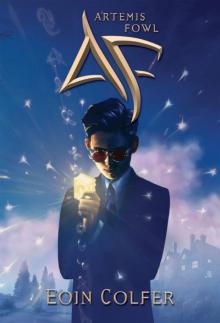 Artemis Fowl
Artemis Fowl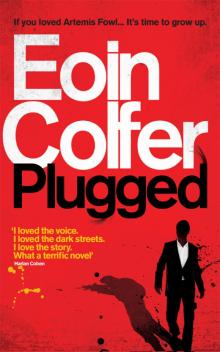 Plugged
Plugged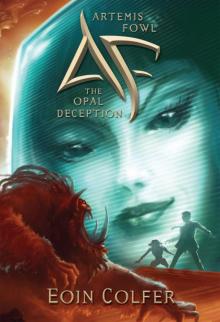 The Opal Deception
The Opal Deception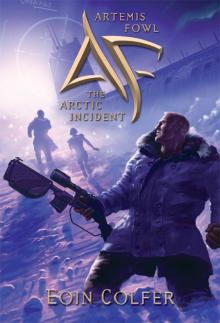 The Arctic Incident
The Arctic Incident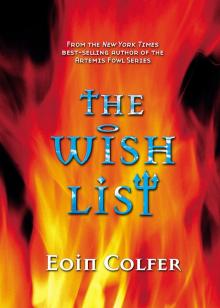 The Wish List
The Wish List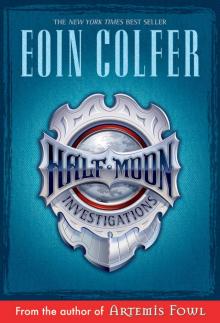 Novel - Half Moon Investigations
Novel - Half Moon Investigations The Supernaturalist
The Supernaturalist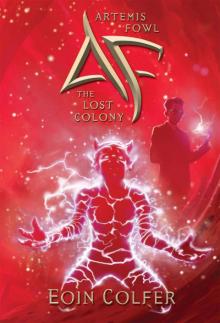 The Lost Colony
The Lost Colony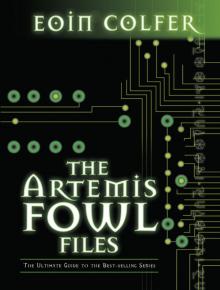 The Artemis Fowl Files
The Artemis Fowl Files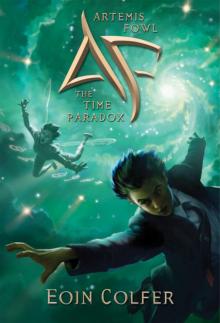 The Time Paradox
The Time Paradox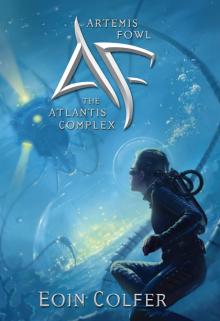 The Atlantis Complex
The Atlantis Complex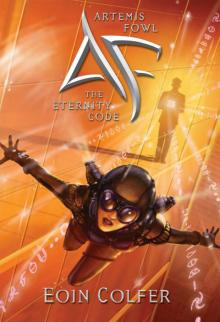 The Eternity Code
The Eternity Code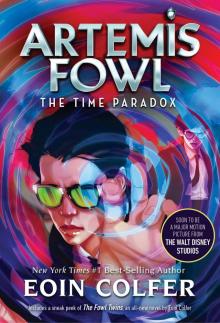 The Time Paradox (Disney)
The Time Paradox (Disney)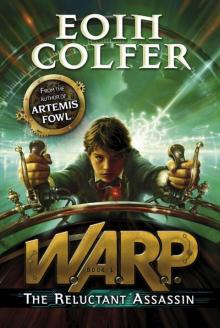 The Reluctant Assassin
The Reluctant Assassin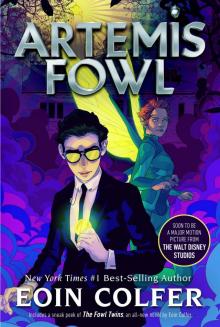 Artemis Fowl (Disney)
Artemis Fowl (Disney)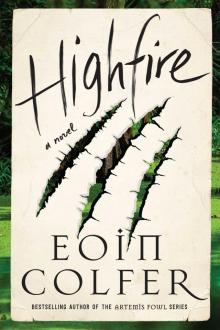 Highfire
Highfire The Last Guardian
The Last Guardian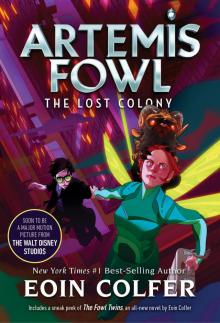 The Lost Colony (Disney)
The Lost Colony (Disney)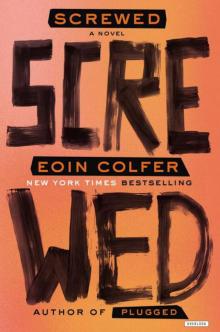 Screwed: A Novel
Screwed: A Novel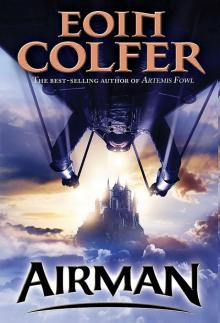 Novel - Airman
Novel - Airman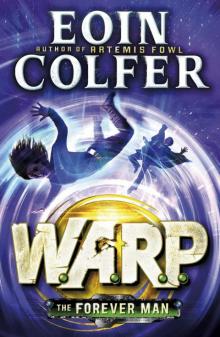 The Forever Man
The Forever Man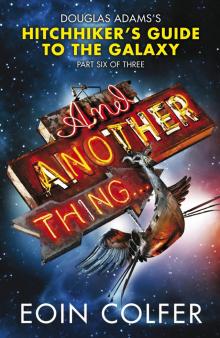 And Another Thing...
And Another Thing...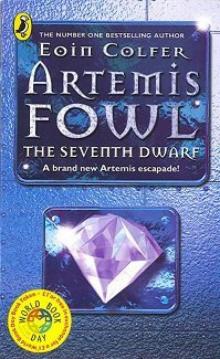 The Seventh Dwarf
The Seventh Dwarf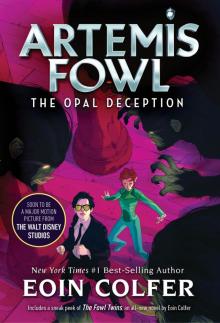 The Opal Deception (Disney)
The Opal Deception (Disney)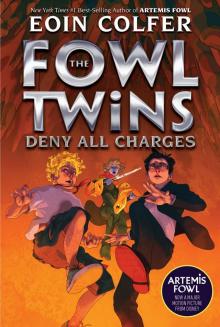 The Fowl Twins Deny All Charges
The Fowl Twins Deny All Charges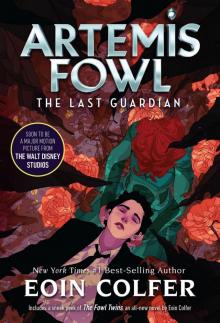 The Last Guardian (Disney)
The Last Guardian (Disney)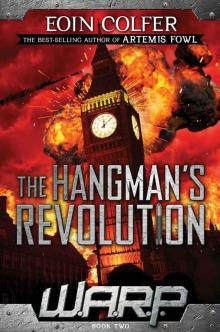 The Hangman's Revolution
The Hangman's Revolution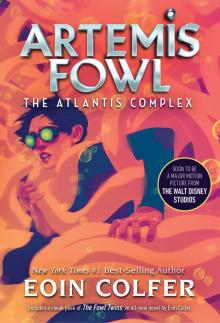 The Atlantis Complex (Disney)
The Atlantis Complex (Disney)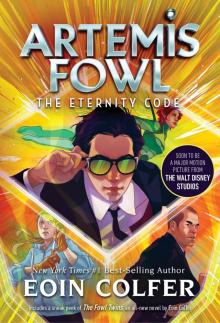 The Eternity Code (Disney)
The Eternity Code (Disney)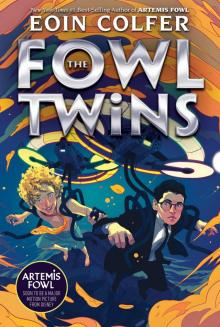 The Fowl Twins
The Fowl Twins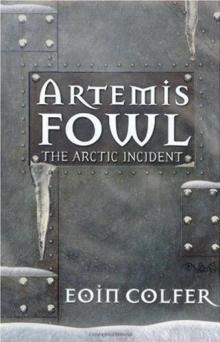 Artemis Fowl. The Arctic Incident af-2
Artemis Fowl. The Arctic Incident af-2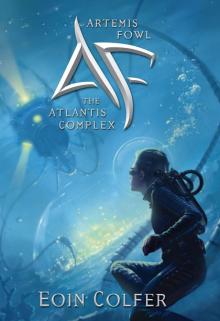 Artemis Fowl and the Atlantis Complex af-7
Artemis Fowl and the Atlantis Complex af-7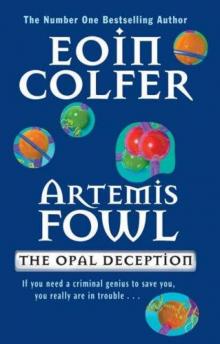 Artemis Fowl. The Opal Deception af-4
Artemis Fowl. The Opal Deception af-4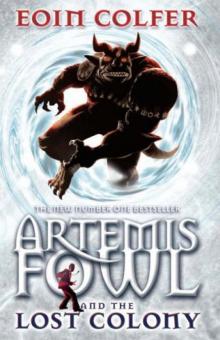 Artemis Fowl. The Lost Colony af-5
Artemis Fowl. The Lost Colony af-5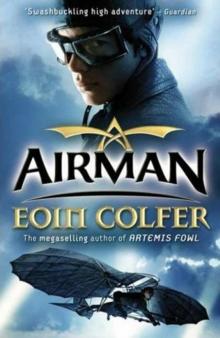 Airman
Airman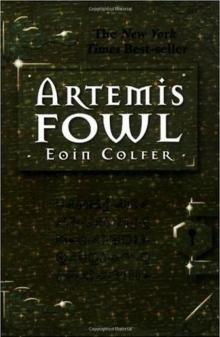 Artemis Fowl af-1
Artemis Fowl af-1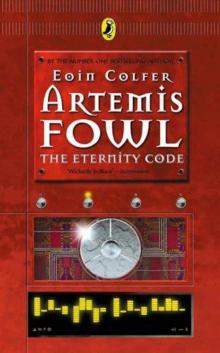 Artemis Fowl: The Eternity Code af-3
Artemis Fowl: The Eternity Code af-3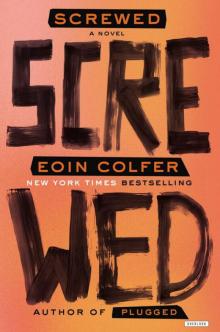 Screwed dm-2
Screwed dm-2